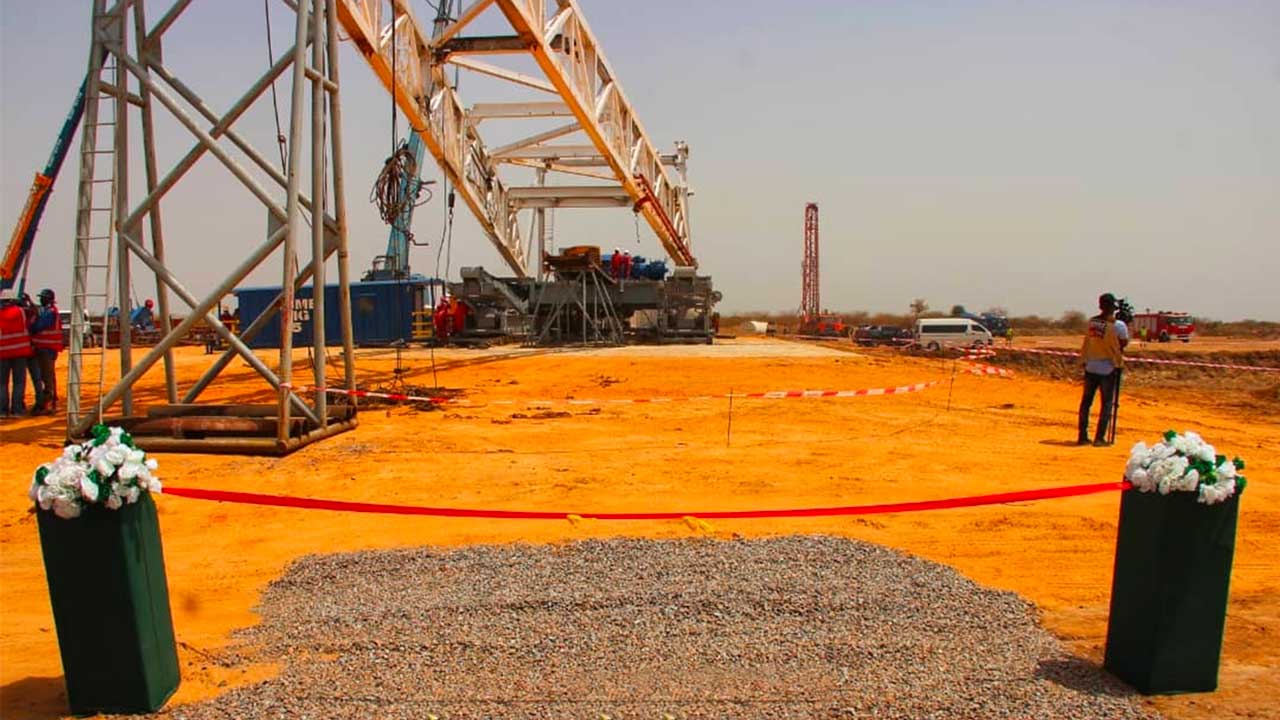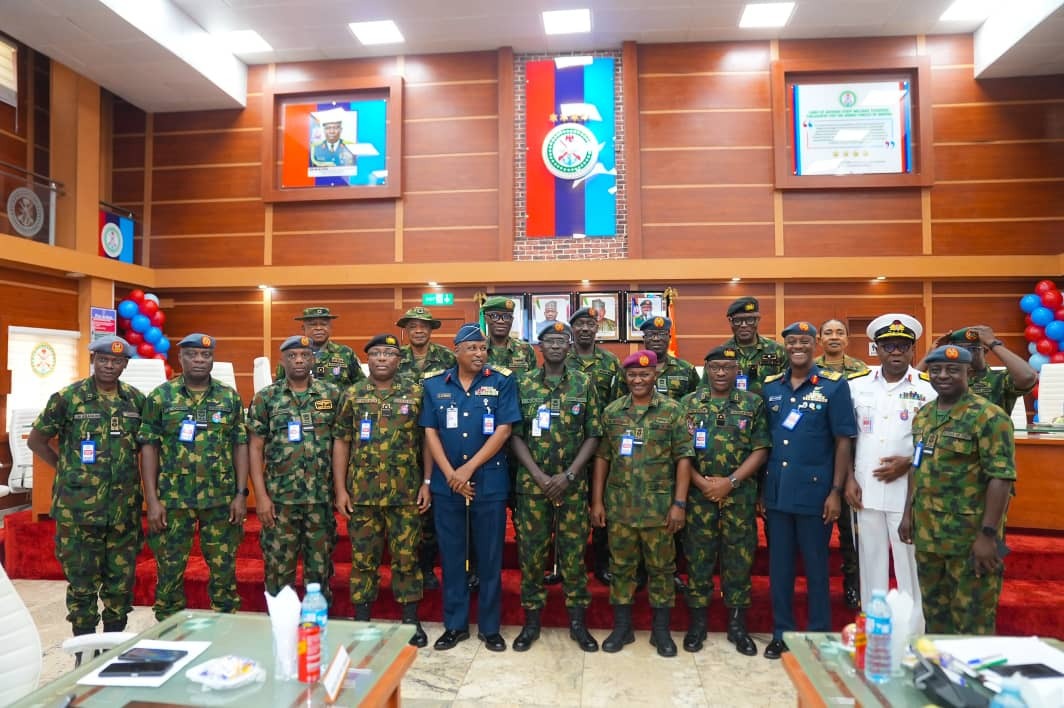
• Questions over capacity of NNPC board amidst commercial viability
• Inland basin exploration is fraud, says ex-MOSOP President
• Zulum: Borno will benefit from being an oil-producing state
Stakeholders, yesterday, raised concerns over continuous prospectivity of oil and gas in the North as President Muhammadu Buhari, who doubles as the Minister of Petroleum Resources, flagged-off resumption of exploration activities in Lake Chad, Borno State.
Six years after abruptly halting exploration activities due to the kidnapping and killing of some workers at the Lake Chad basin by Boko Haram insurgents, the Nigerian National Petroleum Company Limited (NNPCL) with Buhari, joining virtually, kicked-off the spud-in of Wadi-B oil well drilling in Tuba community, Jere Local Government Area of Borno.
The governor of Borno State, Prof. Babagana Zulum, performed the physical flag-off ceremony on behalf of the President. The governor disclosed that the oil findings would impact positively on the living conditions of the people, including economic growth and development. Besides, he added that there could be creation of more jobs for the teeming unemployed youths.
“Today’s event could lead the state to become one of the oil producing states in the Northeast,” he said. He, therefore, pledged the support of the military and other security agencies in securing people’s lives and property.
Excited by the resumption of oil, the Shehu of Borno, Abubakar Umar Garbai El-Kanemi, said: “It has become a reality, despite the promises made to resume oil exploration in the Chad Basin.” He lamented the deplorable roads in the state, as the Federal Government built them in the 1980s.
According to the monarch, 10 Local Government Areas (LGAs) are not connected to the national grid, as Boko Haram destroyed most of the power lines. President Buhari expressed his belief that the successes recorded in the Kolmani River 2 and Nasarawa State will be replicated in the area.
He said: “Crude oil and gas exploration activities have been ongoing in the Chad Basin since 1976 and I also know of the discovery of sub-commercial gas at the Wadi-1 Well in 1985. I am also aware that active drilling activities were suspended in 1995 to enable re-evaluation of exploration activities in the entire frontier basins.
“I am happy that the NNPC has since then conducted extensive Basinal Analysis and Evaluation of all frontier basins leading to the successful drilling and discovery of crude oil and gas in commercial quantities in Kolmani River 2 and providing insight to the ongoing crude oil and gas drilling campaign in Nasarawa as well the current re-entry activities into the Chad Basin.”
The President affirmed that the country stands to benefit immensely from a positive outcome of the operations as there will be an increase in National crude oil and gas reserves and production, enhanced national energy security and greater prosperity for Nigerians.
Coming amid global push towards transition, which has divided stakeholders on the need to deploy resources wisely and get off existing reserves off the ground, industry players yesterday raised concerns on the capacity of the board of NNPCL, which according to the Petroleum Industry Act (PIA) is expected to help the state oil firm take the most viable investment decisions.
With about 30 per cent of NNPCL already legislated to be spent on in-basin exploration, Nigeria may have spent about $800 million on the in-land basins since the PIA was signed about two years ago. Group Chief Executive Officer of NNPCL, Mele Kyari, had earlier said 30 per cent profit share of the company would stand at about $400 million per year.
Although the spending on the inland exploration has remained in secrecy before the passage of the PIA, about $3 billion was allegedly spent on the project, which has been ongoing for over 40 years.
But stakeholders, especially from the oil-rich Niger Delta insisted that the ongoing exploration remained fraudulent and political instead of following business justification.
Kyari at the event said the re-mobilisation of a drilling rig to the Chad Basin for the first time since 1995, brought up a new situation, adding that the previous drilling activity was halted because “our findings were not commercial and we understood very clearly that we need to understand the basin very well.
“Our understanding of the rift system in Nigeria enables us to have successful outcomes in the Kolmani area. It also enabled us to mobilise to Nasarawa State; a drilling activity and an engagement is ongoing.
“It also helped us to understand the geological setting of the Chad Basin which is why we are back here.
“Now we are much more confident, we believe that this campaign will be successful and that this campaign will take us to the ultimate objective, which is to increase the reserves of our country and also create opportunities around us. We believe that the time for oil and gas to vanish is still far away,” Kyari said.
Former President, Movement for the Survival of the Ogoni People (MOSOP), Ledum Mitee, however, noted that exploration of oil or any resource whatsoever should be a business venture, the risk of which should entirely be borne by the would-be investor.
“The so-called inland basin oil exploration violates all known rules of business as it seeks to use funds from existing oil businesses to fund the investment.
“It’s a fraud just as it would, in my view, be fraudulent to take revenue from gold exploitation in Zamfara state, for instance, to fund the search for gold in Rivers state or somewhere else,” Mitee said.
He noted that the PIA, so far as it vests the assets comprising the oil resources in the Federal Government as opposed to the federation, it remained unconstitutional.
Shell and Chevron with Oil Prospecting Licenses (OPLs) 809 and 810 awarded to them respectively, commenced the search for hydrocarbons in the North, especially in the Gongola Basin over 40 years ago under the Production Sharing Contractual (PSC) Agreement on Oil Mining License (OMLs) 118 and 132 for consolidated cost recovery.
In March 2023, Buhari flagged off the spud-in of the Ebenyi-A exploration well located in Obi local government area, Nasarawa, after he conducted the flagging of the Kolmani Integrated Development Project (KIPRO) situated on the boundary between Bauchi and Gombe states in November last year.
Recall that after Shell explored and drilled at Kolmani River-1 and Chevron did the same on Nasara-1, they both backed out after dismal discoveries, and the New Nigeria Development Company (NNDC) thereafter got the two blocks on a PSC basis in the 2005 bid round. The NNPCL, then the Nigeria National Petroleum Corporation (NNPC) became part of the deal.
In 2017, the Nigeria Petroleum Development Company (NPDC), a subsidiary of NNPC agreed to join the NNDC as part of the PSC contractor group, as well as the operator responsible for funding and technical operations.
Unlike other oil field developments, President Buhari added momentum by ordering the NNPC to vigorously spend state funds to explore the in-land basins for hydrocarbons. The focus was on Lake Chad and Gongola Basin.
Frontier Exploration Services (FES) was later created as a subsidiary of the NNPC to pursue the agenda. The development led to the spudding of the Kolmani River-II & III and subsequently Kolmani River-IV to determine the size of hydrocarbon find and explore deeper targets.
On Saturday, February 2, 2019, Buhari flagged off the spud for Kolmani River II Well on the Upper Benue Trough of the Gongola Basin.
About a year later, the NNPC announced the discovery of one billion barrels of oil and over 500 billion standard cubic feet of gas.
While some stakeholders still justify the investment decision on the inland basis, Ghana National Petroleum Corporation (GNPC) Professorial Chair in Oil and Gas Economics and Management at the Institute for Oil and Gas Studies, University of Cape Coast, Ghana and Professor Emeritus in Petroleum Economics and Policy Research at Louisiana State University, Center for Energy Studies, Wunmi Iledare, while the NNPCL Board should legally make best investment decisions going by the PIA, “unfortunately the board was hurriedly constituted and it is not apolitical.
“To me, the NNPCL board as currently constituted, is a wrong prescription for the correct diagnosis of complacency and ineffectual business decisions of the National Petroleum Company in the PIA,” Iledare said.
He disclosed that while exploratory drilling remained a necessary condition for sustainable oil and gas business in a petroleum province or nation, Nigeria must avoid political expediency in driving oil and gas exploration decisions.
Iledare said: “I hope the continuous search for petroleum in Northern Basins is not driven majorly by political expediency at the expense of technology and value optimisation over these last eight years with Buhari as Petroleum Minister.
“Incidentally, Lukman did that much with intensive exploration efforts during his years as Minister of Petroleum and Special Adviser to the President on Petroleum Matters, if I remember correctly.
“Perhaps, advances in new technology will eventually make the dream of commercial petroleum discovery in the Northern Basins in Nigeria a reality sooner than later. It has been a long and expensive searching journey so far.”
Partner in the law firm of Odujinrin & Adefulu, Dr. Adeoye Adefulu, said at a time the rest of the world is divesting from fossil fuel, Nigeria must be strategic around its capital resources.
He noted that harnessing existing reserves remain key for Nigeria, adding that must be balanced with the fear that oil could get stranded in the coming years.
Adefulu said the NNPC board remained key to most of the decisions the company would take, adding that the success or failure of the commercialisation of NNPC depends on the quality of the board.
Managing Partner, BBH Consulting, Ameh Madaki, said the drilling activity is more political than economic or technical. “For years, the government has been wasting scarce resources on frontier basin exploration without meaningful results. Like most absurd policies in the energy sector, this is another clear example of a directionless policy, and an attempt to use propaganda to manage the economy, with disastrous consequences.
“For dwindling production and reserves, sustained oil and gas production at high volumes is driven by investments and a stable operating environment,” he noted.
Some stakeholders noted that the current development would not have been if Buhari happened to be from another part of the country and if the current management and board of the NNPCL were not skewed to favour what they described as a northern agenda.
Division over oil search in north as NNPC returns to Lake Chad






